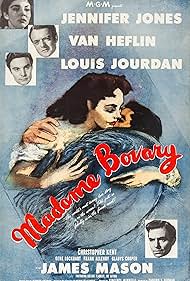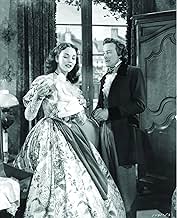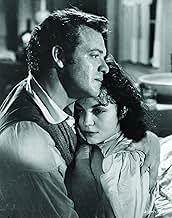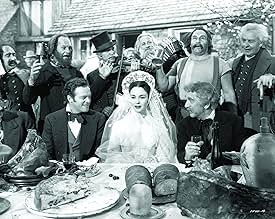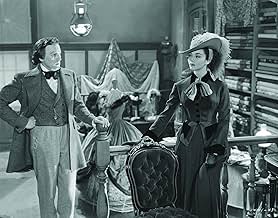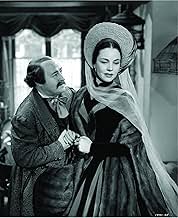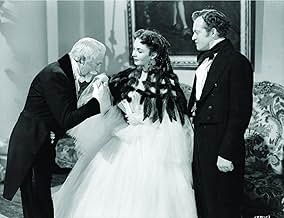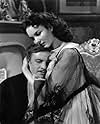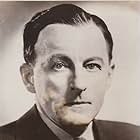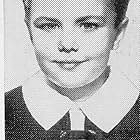IMDb RATING
7.0/10
3.1K
YOUR RATING
A provincial doctor's wife's romantic illusions about life and social status lead her to betray her naive husband, take on lovers, and run up ruinous debts.A provincial doctor's wife's romantic illusions about life and social status lead her to betray her naive husband, take on lovers, and run up ruinous debts.A provincial doctor's wife's romantic illusions about life and social status lead her to betray her naive husband, take on lovers, and run up ruinous debts.
- Director
- Writers
- Stars
- Nominated for 1 Oscar
- 2 wins & 1 nomination total
Alf Kjellin
- Leon Dupuis
- (as Christopher Kent)
Harry Morgan
- Hyppolite
- (as Henry Morgan)
- Director
- Writers
- All cast & crew
- Production, box office & more at IMDbPro
Featured reviews
This MGM film sure sports a terrific cast--Jennifer Jones, James Mason, Van Heflin and Louis Jordan! However, no matter how good the cast and production values are, this is a film that was very, very difficult to produce in 1940s Hollywood due to the restrictions of the Production Code. This code precluded the film from fully realizing Flaubert's novel, as frank discussions of sexuality were not possible--the film never would have been cleared for public exhibition. So, the studio softened it here and there--and reduced the impact any film about this book could have had. I am sure a more modern version of the book would be quite a bit different--ad Madame Bovary's infidelities been a lot less vague.
The film begins with Dr. Bovary coming to Emma's home to treat her father. The Doctor is quite taken by her and eventually marries her--making her Madame Bovary. While quite pretty, there are some serious warning signs that went unnoticed. First, Emma was a bit childish and lived in a fantasy-sort of world where she expected real life to be like a romance novel! As a result, she's ill-equipped to deal with the boredom that comes with everyday life--as she expects constant passion, excitement and variety--not knowing even the rich and powerful live that way! Second, there is a huge disparity between the head in the clouds Emma and her rather nice but bland husband. He cannot possibly live up to her ridiculously high expectations of a man--and soon she goes searching for excitement on her own. Not surprisingly, she gravitates towards affairs, though in time, these, too, are unsatisfying--even lovers cannot always create excitement and distractions. Eventually, this leads to disaster and the story ends.
Not surprisingly, many story elements have been omitted--some due to the code and some due to the confines of a full-length film. For example, the Doctor's first marriage and significant periods in Emma's life are absent--though the spirit of the book is mostly intact.
While not exactly intended, the film seems to be an interesting portrait of what we might now consider to be a Borderline Personality or at least a person with strong Borderline traits. The inability to cope with boredom, interpersonal shallowness, the tendency to self-sabotage and craving for excitement and addiction (in this case, sexual and spending addiction) are all important hallmarks of this disorder. Such classifications were unknown in Flaubert's time, though he clearly seems to be describing such a person in Emma Bovary.
There is only one problem with such a portrait, however. Emma Bovary is in no way sympathetic--she is selfish, vain and pretty stupid. And, to make things worse, her husband is an utter fool as well, as he willfully ignores his wife's 'excesses'. As a result, it's a lovely movie to watch (it is a very glossy MGM production) but its also detached and hard to love...much like Madame Bovary herself!
The film begins with Dr. Bovary coming to Emma's home to treat her father. The Doctor is quite taken by her and eventually marries her--making her Madame Bovary. While quite pretty, there are some serious warning signs that went unnoticed. First, Emma was a bit childish and lived in a fantasy-sort of world where she expected real life to be like a romance novel! As a result, she's ill-equipped to deal with the boredom that comes with everyday life--as she expects constant passion, excitement and variety--not knowing even the rich and powerful live that way! Second, there is a huge disparity between the head in the clouds Emma and her rather nice but bland husband. He cannot possibly live up to her ridiculously high expectations of a man--and soon she goes searching for excitement on her own. Not surprisingly, she gravitates towards affairs, though in time, these, too, are unsatisfying--even lovers cannot always create excitement and distractions. Eventually, this leads to disaster and the story ends.
Not surprisingly, many story elements have been omitted--some due to the code and some due to the confines of a full-length film. For example, the Doctor's first marriage and significant periods in Emma's life are absent--though the spirit of the book is mostly intact.
While not exactly intended, the film seems to be an interesting portrait of what we might now consider to be a Borderline Personality or at least a person with strong Borderline traits. The inability to cope with boredom, interpersonal shallowness, the tendency to self-sabotage and craving for excitement and addiction (in this case, sexual and spending addiction) are all important hallmarks of this disorder. Such classifications were unknown in Flaubert's time, though he clearly seems to be describing such a person in Emma Bovary.
There is only one problem with such a portrait, however. Emma Bovary is in no way sympathetic--she is selfish, vain and pretty stupid. And, to make things worse, her husband is an utter fool as well, as he willfully ignores his wife's 'excesses'. As a result, it's a lovely movie to watch (it is a very glossy MGM production) but its also detached and hard to love...much like Madame Bovary herself!
Jennifer Jones was a star I knew well from visits to the cinema with my family during the 1950's: "The Man in the Grey Flannel Suit", "The Barretts of Whimpole Street", "Love is a Many Splendored Thing" and "A Farewell to Arms".
I cut in on her at a certain stage in her career. She was a bit older than my mum, and although I liked her she didn't have the effect on a prepubescent lad that Yvette Mimieux or Tuesday Weld were having.
It wasn't until later, when we got television, that I saw the movies she made earlier in her career; "Song of Bernadette, "Duel in the Sun", "Portrait of Jennie", "Carrie" and this one: Vincente Minnelli's "Madame Bovary". What an absolute stunner she was.
Emma Bovary (Jennifer Jones) is the beautiful daughter of a poor French family, but she has an overactive imagination fostered by romantic novels.
She marries a country doctor Charles Bovary (Van Heflin) who she doesn't really love hoping to advance her standing in society and pursue her romantic dreams. However she soon outspends her husband's capacity to earn. In an era before credit cards, she maxes-out on credit notes.
Emma attracts men like moths to a flame, and cheats on her husband who still loves her despite everything. There are tears before the final fade out.
The film is bookended with the trial of Gustave Flaubert who wrote the original novel. Apparently the story so outraged the French hierarchy that they took old Gustave to court. He got off and of course the book became a bestseller.
The filmmakers used the trial to allow Gustave (James Mason) to narrate the story - quoting passages of Flaubert's prose. Although narration can be a lazy device in film, in this case, Mason's mellifluous voice puts us in the picture quickly. More importantly, Emma is seen sympathetically despite being hopelessly self-focused.
Two actors added the final touch of class to the 1949 version. Van Heflin is such a nice guy here that we are waiting for someone to smack Emma to her senses. Louis Jordan gives another variation on that smooth roué he played in "Letter to an Unknown Woman" - a not dissimilar drama.
Composer Miklos Rozsa surpassed himself with the score. With its beautiful main theme for Emma and flowing melodies it sweeps you along.
A 2014 version did away with narration. It's more low-key, but quite good with a totally different vibe to the Minnelli version. It was filmed in France and is more explicit with a fair bit of nudity. Jennifer Jones was fortunate that her movie career was in an era where she didn't have to worry about getting in shape for that kind of thing.
I cut in on her at a certain stage in her career. She was a bit older than my mum, and although I liked her she didn't have the effect on a prepubescent lad that Yvette Mimieux or Tuesday Weld were having.
It wasn't until later, when we got television, that I saw the movies she made earlier in her career; "Song of Bernadette, "Duel in the Sun", "Portrait of Jennie", "Carrie" and this one: Vincente Minnelli's "Madame Bovary". What an absolute stunner she was.
Emma Bovary (Jennifer Jones) is the beautiful daughter of a poor French family, but she has an overactive imagination fostered by romantic novels.
She marries a country doctor Charles Bovary (Van Heflin) who she doesn't really love hoping to advance her standing in society and pursue her romantic dreams. However she soon outspends her husband's capacity to earn. In an era before credit cards, she maxes-out on credit notes.
Emma attracts men like moths to a flame, and cheats on her husband who still loves her despite everything. There are tears before the final fade out.
The film is bookended with the trial of Gustave Flaubert who wrote the original novel. Apparently the story so outraged the French hierarchy that they took old Gustave to court. He got off and of course the book became a bestseller.
The filmmakers used the trial to allow Gustave (James Mason) to narrate the story - quoting passages of Flaubert's prose. Although narration can be a lazy device in film, in this case, Mason's mellifluous voice puts us in the picture quickly. More importantly, Emma is seen sympathetically despite being hopelessly self-focused.
Two actors added the final touch of class to the 1949 version. Van Heflin is such a nice guy here that we are waiting for someone to smack Emma to her senses. Louis Jordan gives another variation on that smooth roué he played in "Letter to an Unknown Woman" - a not dissimilar drama.
Composer Miklos Rozsa surpassed himself with the score. With its beautiful main theme for Emma and flowing melodies it sweeps you along.
A 2014 version did away with narration. It's more low-key, but quite good with a totally different vibe to the Minnelli version. It was filmed in France and is more explicit with a fair bit of nudity. Jennifer Jones was fortunate that her movie career was in an era where she didn't have to worry about getting in shape for that kind of thing.
Gustave Flaubert's Madame Bovary is beautiful and shocking, one of the European literary greats. While it is not the most faithful adaptation around, Vincente Minnelli's Madame Bovary does stand on its own two feet and is a beautiful film in its own right. It does suffer from what made the book so complex and shocking not being fully allowed to come out due to the limitations of the Production Code at the time of it being made and released(maybe the film's length too). So you do miss the stuffiness and hypocrisy of French provincial life, which I always took as a crucial part to Emma's character, while the script could have done with more of a dark edge and Minnelli's direction is often dazzling and technically skilled(the ballroom sequence has to be a highlight in his directorial career) but also a little too relaxed in places, so the drama has occasional stodginess. But it is unfair to dismiss Madame Bovary due to these because its positives are a great many. That it is one of the most visually beautiful films of the 40s is one, the costumes are evocative and astonishingly elegant, Emma's dresses are a wow factor while the sets are the very meaning of grand with a Baroque/Roccocco influence. The photography dazzles just as much as Minnelli's technical style in the ballroom sequence(an intricate and in all senses wonderful scene, perhaps one of the greats in cinematic history). Miklos Rosza's music score is another huge part of the appeal, one of his best, the stylistic elegance, haunting undercurrent and energy are all here in the score, the Madame Bovary Waltz being the most memorable.
The script may lack edge, but it does maintain the book's ironic humour and is very poignant too without descending into melodrama, and the story regardless of the watering down still compels and moves. Some may find Flaubert's narration and trial at the beginning unnecessary, to me it was actually very interesting- James Mason's thoughtfully earnest performance as Flaubert helps- and that the book itself caused a scandal at the time and is still controversial now made it further easier to understand why the book's depth doesn't quite come through here. The aforementioned ballroom sequence is the highlight of the film, but the deserted windswept streets in the middle of the night scene where Emma is waiting for Rudolphe is beautifully shot and emotionally telling. The performances are fine, Jennifer Jones is very moving(not to mention stunning to look at), she does capture the selfishness and insufferable woman traits that Emma has yet makes it clear Emma is also a victim of her own passions, it is very easy to not stand Emma and make her one-dimensional but with Jones there is a degree of compassion. Van Heflin is sympathetic and mild-mannered without being too much of a bore and oafish without being too much of a dork and clown, like with Jones both of those are easy traps to fall into. Louis Jourdan is perfectly cast, suave and charismatic while conflicted and menacing. Alf Kjellin is a gentle Leon, a good contrast to Jourdan's Rudolphe, while Gladys Cooper as ever is a scene stealer as is Frank Allenby as the malefic L'Hereux. Harry Morgan and Gene Lockhart are dependably solid. Overall, a beautiful film but those wanting a faithful adaptation of Madame Bovary(a big ask really as it is perhaps one of the most difficult books to adapt) may want to look elsewhere. But even then, there will be people who think that to some extent but still take this film for what it is. 8/10 Bethany Cox
The script may lack edge, but it does maintain the book's ironic humour and is very poignant too without descending into melodrama, and the story regardless of the watering down still compels and moves. Some may find Flaubert's narration and trial at the beginning unnecessary, to me it was actually very interesting- James Mason's thoughtfully earnest performance as Flaubert helps- and that the book itself caused a scandal at the time and is still controversial now made it further easier to understand why the book's depth doesn't quite come through here. The aforementioned ballroom sequence is the highlight of the film, but the deserted windswept streets in the middle of the night scene where Emma is waiting for Rudolphe is beautifully shot and emotionally telling. The performances are fine, Jennifer Jones is very moving(not to mention stunning to look at), she does capture the selfishness and insufferable woman traits that Emma has yet makes it clear Emma is also a victim of her own passions, it is very easy to not stand Emma and make her one-dimensional but with Jones there is a degree of compassion. Van Heflin is sympathetic and mild-mannered without being too much of a bore and oafish without being too much of a dork and clown, like with Jones both of those are easy traps to fall into. Louis Jourdan is perfectly cast, suave and charismatic while conflicted and menacing. Alf Kjellin is a gentle Leon, a good contrast to Jourdan's Rudolphe, while Gladys Cooper as ever is a scene stealer as is Frank Allenby as the malefic L'Hereux. Harry Morgan and Gene Lockhart are dependably solid. Overall, a beautiful film but those wanting a faithful adaptation of Madame Bovary(a big ask really as it is perhaps one of the most difficult books to adapt) may want to look elsewhere. But even then, there will be people who think that to some extent but still take this film for what it is. 8/10 Bethany Cox
Although it is several years since I saw it I can remember the beautiful photography and period setting of this not very happy story of a tormented woman.Particularly Jennifer Jones,a vastly underrated actress giving a sensitive performance which one imagined could have done with a bit more directoral guidance. Minnelli was one of those directors who seemed to give all or nothing to his projects.By his own admission he had very little interest in "Kismet" as he wanted to get it out of the way in order to start "Lust for Life" with Kirk Douglas.The lumbering manner of "Kismet" shows this to be true !! (he owed MGM one picture under his contract before starting "Lust for Life" and unfortunately for the project "Kismet" was it)Additionally Minelli did not want Jones in the lead role and one wonders how influencial David Selznick was in pushing for Jennifer once Lana Turner was unavailable for the lead.At any rate Lana had not yet developed her dramatic abilities which would lie some years ahead.Jennifer showed that she was adaptable to many moods including a few years later her scene stealing turn in "Beat the Devil" few actresses can take credit for stealing a picture away from Bogie,Peter Lorre,Robert Morley and LaLolla. Back to Madame Bovary,although the subject is a heavy one,it is well handled by Minnelli,and most reference books today regard it as a sadly neglected piece,which deserves a wider recognition.Interestingly if my memory serves me correctly Vincente barely mentions it in his autobiography.Maybe his private life at the time and his more financially successful works figure more prominantly in his memory.If I had directed Madame Bovary I would be immensly proud of it.Maybe he was.
Films of great novels are usually light years away in terms of quality from their originals. There are of course a few exceptions, the David Lean Dickens adaptations for instance and recently a Neil Jordan version of Graham Greene's "The End of the Affair" that I much admired. Generally it is second rate literature, "Gone WIth the Wind" a prime example, that fares so much better. Flaubert's "Madame Bovary" has continued through the history and development of cinema and TV to exert its fascination on would-be translators, although it has to be admitted that it has generally proved elusive. One would have thought that it would have fared particularly well in the hands of outstanding French directors such as Renoir and Chabrol but their efforts to come to grips with Flaubert's masterpiece have ultimately to be judged as among their lesser works. There is quite a lot going for Jean Renoir's early 1933 version, not least the authentic Normandy exteriors shot with great affection, but technically the film shows its age. It is rather like a series of tableaux, some in themselves quite well done, but ultimately lacking a strong narrative thrust and sense of cohesion. Nevertheless I remember being more impressed with it than with Claude Chabrol's 1991 version which I found surprisingly cold and passionless. I admit I have only seen this once and my memory of it is far from clear, perhaps because it grabbed me so little at the time. It may seem rather preposterous to award the accolade for the best "Bovary" to Vincente Minnelli's Americanised 1949 MGM version with its studio mock-up of a French village that seems more of a Flanders lookalike and some location work clearly done in Californian woodland, but, in the absence of so little competition, I would have to plump for it as being certainly the most enjoyable. After all it has that quite exquisite beauty, Jennifer Jones, as the eponymous heroine, suffering and eventually dying as tenderly as only she can. My favourite memory from the film is her first appearance on the farm where Doctor Bovary is calling to tend to her sick father. There she is in a setting of all too believable rural squalor decked out in the most unbelievably opulent dress imaginable. If nothing else it makes Bovary's initial besottedness with her absolutely credible. Minnelli's is a rather sanitised adaptation. Okay to have the heroine die beautifully once the initial agony of taking poison has been established, but the inevitable outcome of a botched operation on a villager's clubfoot - amputation - is, unlike in the novel and other versions, evaded by the doctor's refusal to take on the medical challenge. It makes for rather more comfortable box-office. There are some beautifully done scenes including the almost obligatory inclusion in a Hollywood period piece of a ballroom sequence. The one here has the hedonistic movement that is everything we had come to expect from "The Great Waltz" onwards. There is also the heroine's wait, her bags fully packed in a windswept street after dark for the lover that never comes. Wyler did it rather better in "The Heiress" but Minnelli's has plenty of atmosphere. His version may be even further than its competitors from Flaubert's "Madame Bovary" but he invests it with enough passion and commitment to ensure it a small place in Hollywood history.
Storyline
Did you know
- TriviaAfter the expensive box-office failure of The Pirate (1948), director Vincente Minnelli worked hard to cut corners on this film, fearing he might be accused of extravagance. However, he devoted a great deal of time to the ball sequence, which he regarded as the most important scene in the film; he even had composer Miklós Rózsa compose the waltz theme used in it well in advance of the start of filming.
- GoofsWhen Madame Bovary asks Leon for money, he reacts by punching out one of the glass window panes. But on the next cut, the previously shattered window pane is now intact.
- Quotes
Emma Bovary: Do you know, Charles, why that clock strikes? To announce the death of another hour.
- Alternate versionsAlso shown in a computer colorized version.
- ConnectionsFeatured in Some of the Best: Twenty-Five Years of Motion Picture Leadership (1949)
- How long is Madame Bovary?Powered by Alexa
Details
- Release date
- Country of origin
- Official site
- Language
- Also known as
- Madame Bovary und ihre Liebhaber
- Filming locations
- Production company
- See more company credits at IMDbPro
- Runtime1 hour 54 minutes
- Color
- Aspect ratio
- 1.37 : 1
Contribute to this page
Suggest an edit or add missing content

